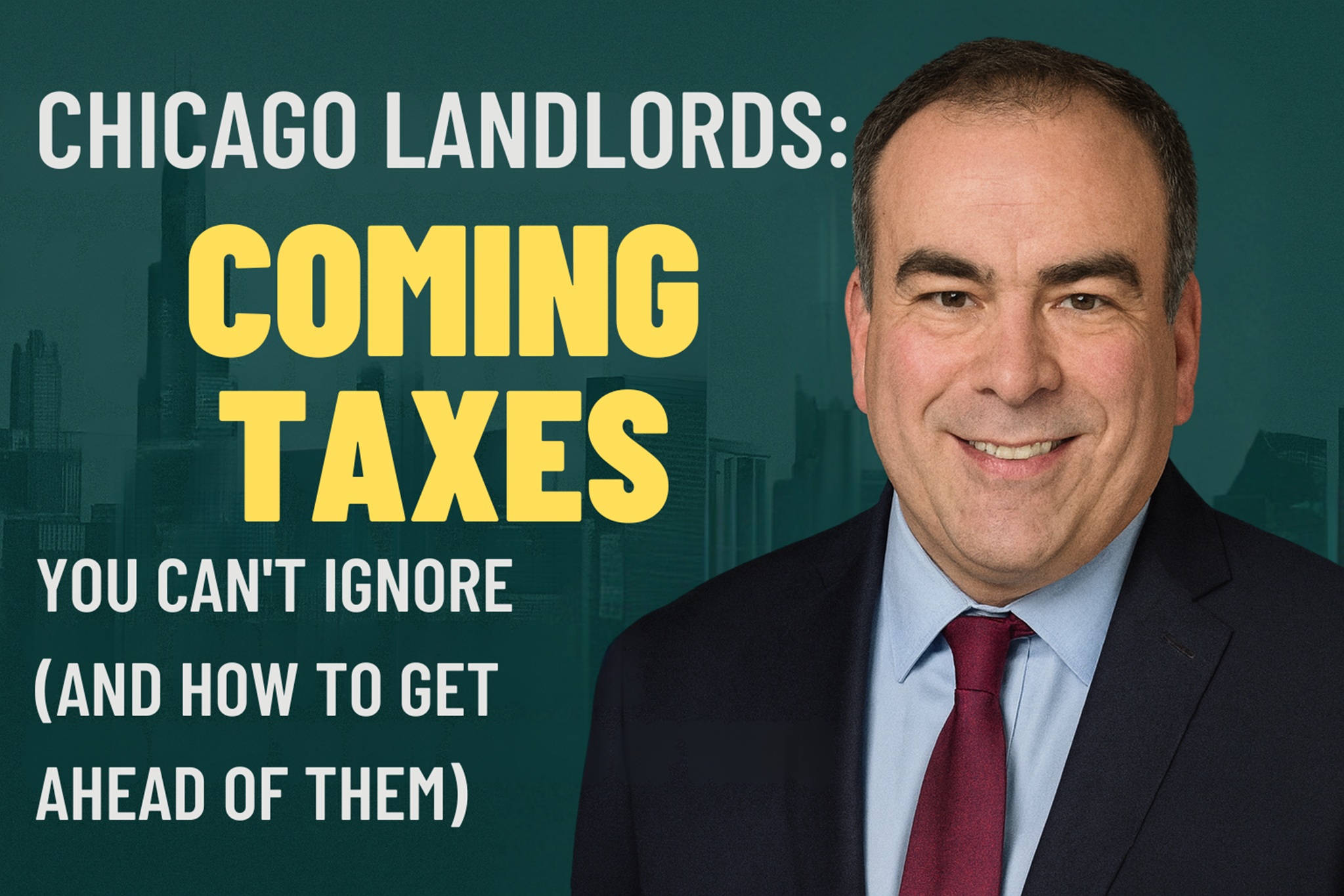
Author: Mark Ainely | Partner GC Realty & Development & Co-Host Straight Up Chicago Investor Podcast
Let’s skip the small talk and go straight to the headache: property taxes are shifting under your feet. If you own rentals in the City of Chicago or anywhere in Cook County, what you pay (and when you pay it) is evolving, sometimes quietly, sometimes loudly, and almost always at the worst possible time for cash flow
In the last year, we’ve watched property tax timing slide (again), city fees and taxes shuffle, proposals rise and fall, and special rules kick in for anyone dabbling in short-term rentals, or even just leasing equipment instead of buying it outright. If you’re managing a rent roll, you need to know what’s coming, because property taxes hit your bottom line just as hard as vacancy and maintenance.
Below, I’ll walk through what’s real today, what’s likely next, and what’s just noise, with plain-English action steps to protect your cash flow.
Want to hear more right from Fritz Kaegi, the Cook County Assessors mouth? Watch our interview we had with him.
1) The Big One: Cook County Property Taxes (Timing, Delays & Budget Ripples)
What’s new: For Tax Year 2024 in Cook County (billed in 2025), the first installment was due March 4, 2025. The second installment due date remains “to be determined” (yes, again), as the county has not yet finalized and released the bills. That means calendars are mushy and your cash-flow planning needs buffers.
Why it matters: Second-installment delays push uncertainty into your operating budget and debt service schedule. Lenders don’t love surprises, and neither do investors counting on predictable distributions.
Context you should care about: Chicago passed its FY2025 budget without a property-tax hike, after months of debate. That’s good news, but the city still adopted $180M+ in other taxes/fees to fill holes. Translation: while the citywide levy didn’t spike for 2025, the pressure didn’t vanish; it just shifted.
Action for landlords:
Hold an escrow buffer for the second installment bill. Until the Treasurer posts a due date, assume little notice.
If your properties are in neighborhoods with shifting assessments, keep an eye on post-appeal impacts to the tax base; downtown commercial adjustments ripple into everyone else’s share.
With taxes going up make sure your rent isn’t stale, run our Free Rent Analysis to model NOI with conservative tax assumptions.
2) Real Estate Transfer Tax: What Actually Happened, And What Might Come Back
What’s real now: Chicago’s flat 0.75% city transfer tax remains unchanged. The March 2024 “Bring Chicago Home” referendum, which would have reduced the rate under $1M and increased it above $1M, failed. So, if you sell, you’re still under the old structure.
What to watch next: The transfer-tax idea isn’t dead politically. We’ve seen talk resurface in different forms (city and state arenas), including 2025 advocacy notes about bigger transfer taxes in suburban Cook and collar counties for transit funding, and renewed tiered-rate chatter. These aren’t enacted for Chicago today, but they’re the type of policy that routinely returns to the table. Plan sales and exchanges with a “what-if” cushion.
Action for landlords:
If you’re refinancing or listing this year, run scenarios with both current 0.75% and a hypothetical tiered increment on >$1M sale price.
If a sale triggers capital reallocation, revisit timing and 1031 exchange strategy (especially if you’re eyeing suburban dispositions facing separate proposals).
Own a building with 7 units or more? Here is a huge loophole in Cook County For you. Watch our interview with Community Investment Corporation’s CEO Stacie Young and Cook County Assessor Fritz Kaegi talking about the program for Chicago investors.
3) City of Chicago Tax Changes You’ll Actually Feel in Operations (Even if Not a “Landlord Tax”)
Sometimes taxes don’t hit your rental income directly, they nickel-and-dime your operations. Two standouts for 2025:
a) Personal Property Lease Transaction Tax: 11%
Effective Jan 1, 2025, Chicago raised its Personal Property Lease Transaction Tax to 11%. This is the city’s “lease tax” on leasing personal property and non-possessory computer access (think: many software subscriptions used in property management). If you lease gear (e.g., equipment, copiers) or you pay for SaaS that the city treats as taxable, your ops line just got pricier.
Action:
Audit your subscriptions and leases (property-management software, screening tools, e-signature, CRMs). Expect an 11% city tax on many items. Budget accordingly and negotiate enterprise plans where usage is growing.
b) Illinois Sales/Use Tax on Leases of Tangible Personal Property
Also from Jan 1, 2025, Illinois shifted tax treatment so that lease receipts (payments under a lease of tangible personal property) are subject to sales tax. In practical terms, if your operation leases appliances (instead of purchasing) or other physical equipment, those lease payments now carry sales tax going forward, even for contracts signed before 2025 (tax applies to amounts received on/after Jan 1, 2025).
Action:
If you were leasing appliances/furnishings, compare total life-cycle cost of leasing vs. buying given the new sales tax drag. Some owners will switch to buy-and-depreciate.
4) Short-Term Rental (STR) Taxes: If You Host Under 30 Days, Read This Twice
If you (or your tenants) run vacation rentals or shared housing (29 nights and shorter), you’re playing under a different rulebook. Chicago piles on city hotel-type taxes and surcharges (base Hotel Accommodations Tax + Shared Housing/Vacation Rental surcharges + Domestic Violence surcharge), plus Cook County and State hotel taxes. Some platforms collect/remit automatically, but you’re still on the hook for compliance.
Recent administrative shifts: There’s continuing state-level administration attention on STRs (including marketplace reporting and collection duties phasing in), so expect more enforcement/data matching on the way. If you rely on STR income anywhere in the portfolio, make sure your filings align with platform remittances.
Action for landlords:
Verify that Airbnb/Vrbo are collecting/remitting the correct city, county, and state taxes for your listings, and keep your own records in case of audit.
If your building is RLTO-covered, confirm your lease and rules prohibit unauthorized STR activity to avoid tax exposure and code violations. (See RLTO/RTLO resources below.)
5) The Perennial Political Footballs to Monitor (So You Don’t Get Blitzed)
Here’s what’s not a done deal today but could impact you with little runway:
Chicago Transfer-Tax Revisions (Tiered Structures): The 2024 referendum failed, but similar proposals have a way of returning in new forms. Track City Council agenda items closely if you’re planning a sale above $1M.
Regional/State Transfer-Tax Ideas: 2025 advocacy updates flagged suburban Cook/collar-county transfer-tax proposals tied to transit. If you own outside city limits, watch Springfield.
City Service Fees (Garbage/Etc.): Chicago’s $9.50 per-unit, per-month garbage fee (for properties receiving city collection) has been frozen since 2016 but regularly comes up as a potential revenue lever. A future increase wouldn’t shock anyone.
Action for landlords:
If you’re planning a 12–18 month hold, add a modest “policy drift” reserve (we budget 0.25%–0.5% of gross rents) to cushion a new fee or levy.
If you’re mid-rehab and the exit is a sale, keep headlines on transfer tax proposals in your weekly review.
6) Practical Playbook: How to Budget, Price, and Communicate Taxes in 2025
Problem: Taxes are variable; your rent is (temporarily) fixed. That spread is your pain.
Game plan:
Price rentals with the calendar in mind. If the second installment lands late, your escrow may spike when you least want it. Use GC Realty’s Free Rent Analysis to model rent vs. likely tax timing, especially if your comps are static and your costs aren’t.
Annual vendor/SaaS audit. The City’s 11% lease tax hits software and equipment leases. Negotiate, consolidate, or switch vendors if your stack bloated in 2023–2024.
Lease vs. buy for appliances & equipment. With Illinois sales tax on lease receipts, the math changed. Run TCO and depreciation scenarios before renewing any lease.
STR guardrails. If you own in buildings tempted by short stays, lock down lease clauses and house rules. Unauthorized STRs can create tax and compliance exposure. (Review your RLTO/RTLO documents.)
Communication cadence. Owners and partners hate tax surprises more than bad news. Add a “tax watch” line to monthly updates so everyone sees what we’re tracking and why it matters.
7) Frequently Asked Questions We’re Getting Right Now
Q1) Will my Chicago property taxes go up in 2025 because of the city budget?
Short answer: The FY2025 budget passed without a property-tax hike. But the city raised other taxes and fees to fill the gap. Your Cook County bill still depends on assessments, levies, and your taxing districts.
Q2) Why does the second installment keep getting delayed?
Cook County posts the due date after tax amounts are finalized; this process has run late multiple years recently. Plan for uncertainty and keep checking the Treasurer’s updates.
Q3) I lease my building’s appliances, did the tax law change anything?
Yes. Illinois now taxes lease receipts on or after Jan 1, 2025, even for older contracts. Your appliance lease payment likely now carries sales tax. Consider buying instead of leasing at renewal.
Q4) My software invoices suddenly include an extra percentage, what’s that?
Likely Chicago’s Personal Property Lease Transaction Tax: 11% as of Jan 1, 2025. Many SaaS tools are taxed under the city’s “non-possessory computer” rules.
Q5) We’re exploring short-term rentals in a condo, who pays what taxes?
Chicago imposes a 4.5% Hotel Tax plus shared-housing/vacation rental surcharges and a 2% domestic violence surcharge, on top of Cook County and State lodging taxes. Platforms often collect/remit, but you’re responsible for compliance and filings where required.
Q6) Is the “Bring Chicago Home” transfer-tax increase coming back?
The March 2024 referendum failed. That said, transfer-tax changes are a recurring policy idea, keep one eye on City Hall if you plan a sale above $1M.
Q7) Could the city raise the garbage fee that shows up on the water/sewer bill?
It’s been $9.50 per unit per month since 2016 and frequently discussed as a revenue lever. Not increased as of today, but it’s on the radar in budget talks.
Q8) I own in the suburbs, should I worry about new transfer taxes?
There have been state-level proposals to boost suburban Cook/collar-county transfer taxes tied to transit funding. Nothing you owe today, but it’s smart to model a “what-if” if you’re prepping to sell.
8) The Investor Mindset: Control What You Can, Price for What You Can’t
Here’s the Chicago property-management reality: you don’t control taxes, but you do control pricing, communication, vendor costs, and policy compliance. If you wait for perfect clarity, you’ll always be late.
Your next three moves:
Run a rent/NOI check with conservative tax timing, use the Free Rent Analysis to calibrate your price against real comps and budget stress.
SaaS & lease audit, trim or consolidate tools taxed under the city’s lease tax; re-price appliance/equipment strategies under Illinois’ lease-receipt tax.
Policy hygiene, tighten leases against unauthorized STRs, and align with RLTO/RTLO so tax/fee exposure doesn’t become a compliance issue with expensive side effects. (Start with our RLTO and RTLO eBook.)
Stay Ahead with GC Realty
Uncertainty in tax policy is the new normal. As a landlord, the only way to avoid a nasty surprise is to stay informed and build flexibility into your operations. GC Realty & Development continuously monitors legislative changes and helps clients adjust pricing, leases and budgets accordingly. Subscribe to our blog, explore our Tenant Placement Service if you’re tired of DIY tenant searches, and download our RTLO e‑book to make sure your leases protect you against unauthorized short‑term rentals and other compliance pitfalls.
The bottom line: taxes will change, sometimes quietly, sometimes dramatically. Prepare now, plan for contingencies, and lean on professionals who live and breathe Chicago’s housing laws. That’s how you protect your cash flow and keep your rentals profitable in the face of shifting policies.
Who Is On Your Team?
We’ve shared a lot of information here on investing in real estate locally in Chicagoland. If you live outside the area, it may seem overwhelming for those wanting to invest in the Chicago market. But we just look at it as a team sport.
Who’s on your investing team? Do you even have a team? GC Realty & Development, LLC has a dedicated team of professionals willing to share decades of experience in all facets of real estate investment. We handle everything from brokerage, leasing, and property management. Whether you hire us or not, we’re happy to provide our resources and expertise.
What gets me up in the morning and keeps me going 12 hours a day is the ability to add value to local area investors in Chicago and beyond! Those who connect with me often hear me say that our goal is to bring value to everyone we come in contact with.
We hope that in return, they will one day hire us for our tenant placement or property management services, refer us to someone they know, or leave a review about our services. We would clearly love all three; however, we’re happy whenever we get the opportunity to help!
Reach out today!

Partner / Co-Host of Straight Up Chicago Investor Podcast

 Vendor Portal
Vendor Portal



